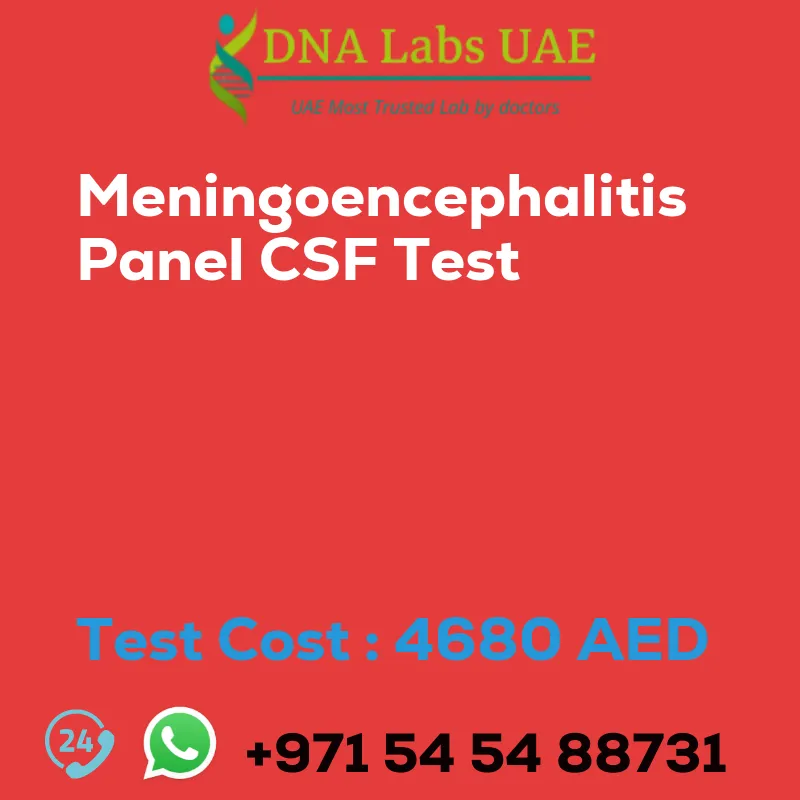ME MENINGOENCEPHALITIS PANEL CSF Test
Components
- Bacteria:
- E.coli K1
- Haemophilus influenza
- Listeria monocytogenes
- Neisseria meningitidis
- Streptococcus agalactiae (Group B)
- Streptococcus pneumoniae
- Fungus:
- Cryptococcus neoformans/gatti
- Viruses:
- Cytomegalovirus (CMV)
- Enterovirus
- Herpes simplex type 1 (HSV-1)
- Herpes simplex type 2 (HSV-2)
- Human Herpes Virus 6 (HHV-6)
- Human Parechovirus
- Varicella zoster virus (VZV)
Price: 4680.0 AED
Sample Condition
Submit 1 mL (0.5 mL min.) CSF in a sterile screw capped container. Ship refrigerated. DO NOT FREEZE.
Report Delivery
Sample Daily by 1 pm; Report Same day
Method
Film Array Multiplex PCR
Test Type
Disorders of Central Nervous System
Doctor
Neurologist
Test Department
Pre Test Information: No special preparation required
Test Details
The Meningoencephalitis (ME) Panel CSF test is a diagnostic test that is used to detect and identify the cause of meningitis or encephalitis. Meningitis is the inflammation of the meninges, the protective membranes that surround the brain and spinal cord, while encephalitis is the inflammation of the brain itself. Both conditions can be caused by various infectious agents, including bacteria, viruses, fungi, and parasites.
The ME Panel CSF test involves analyzing a cerebrospinal fluid (CSF) sample, which is obtained through a lumbar puncture (spinal tap). The CSF sample is then tested for the presence of specific pathogens or markers of infection. The test can detect a wide range of infectious agents, including common ones such as herpes simplex virus (HSV), varicella-zoster virus (VZV), enteroviruses, and bacteria like Streptococcus pneumoniae and Neisseria meningitidis.
The ME Panel CSF test is typically ordered when a patient presents with symptoms suggestive of meningitis or encephalitis, such as severe headache, fever, stiff neck, confusion, and neurological abnormalities. The test helps to identify the causative agent, which is crucial for determining the appropriate treatment. Prompt diagnosis and treatment are essential for these conditions, as they can be life-threatening if left untreated.
It is important to note that the ME Panel CSF test is just one component of the diagnostic process for meningitis or encephalitis. Other tests, such as blood cultures, imaging studies (e.g., MRI), and additional CSF tests (e.g., cell count, protein, glucose) may also be performed to aid in the diagnosis and management of these conditions. The specific tests ordered may vary depending on the individual patient’s clinical presentation and suspected etiology.
| Test Name | ME MENINGOENCEPHALITIS PANEL CSF Test |
|---|---|
| Components | *14 Pathogens detectedBacteria: *E.coli K1 *Haemophilus influenza *Listeria monocytogenes *Neisseria meningitidis *Streptococcus agalactiae (Group B) *Streptococcus pneumoniaeFungus: *Cryptococcus neoformans/gatti Viruses: *Cytomegalovirus (CMV) *Enterovirus *Herpes simplex type 1 (HSV-1) *Herpes simplex type 2 (HSV-2) *Human Herpes Virus 6 (HHV-6)*Human Parechovirus *Varicella zoster virus (VZV) |
| Price | 4680.0 AED |
| Sample Condition | Submit 1 mL (0.5 mL min.) CSF in a sterile screw capped container. Ship refrigerated. DO NOT FREEZE. |
| Report Delivery | Sample Daily by 1 pm; Report Same day |
| Method | Film Array Multiplex PCR |
| Test type | Disorders of Central Nervous System |
| Doctor | Neurologist |
| Test Department: | |
| Pre Test Information | No special preparation required |
| Test Details |
The Meningoencephalitis (ME) Panel CSF test is a diagnostic test that is used to detect and identify the cause of meningitis or encephalitis. Meningitis is the inflammation of the meninges, the protective membranes that surround the brain and spinal cord, while encephalitis is the inflammation of the brain itself. Both conditions can be caused by various infectious agents, including bacteria, viruses, fungi, and parasites. The ME Panel CSF test involves analyzing a cerebrospinal fluid (CSF) sample, which is obtained through a lumbar puncture (spinal tap). The CSF sample is then tested for the presence of specific pathogens or markers of infection. The test can detect a wide range of infectious agents, including common ones such as herpes simplex virus (HSV), varicella-zoster virus (VZV), enteroviruses, and bacteria like Streptococcus pneumoniae and Neisseria meningitidis. The ME Panel CSF test is typically ordered when a patient presents with symptoms suggestive of meningitis or encephalitis, such as severe headache, fever, stiff neck, confusion, and neurological abnormalities. The test helps to identify the causative agent, which is crucial for determining the appropriate treatment. Prompt diagnosis and treatment are essential for these conditions, as they can be life-threatening if left untreated. It is important to note that the ME Panel CSF test is just one component of the diagnostic process for meningitis or encephalitis. Other tests, such as blood cultures, imaging studies (e.g., MRI), and additional CSF tests (e.g., cell count, protein, glucose) may also be performed to aid in the diagnosis and management of these conditions. The specific tests ordered may vary depending on the individual patient’s clinical presentation and suspected etiology. |








